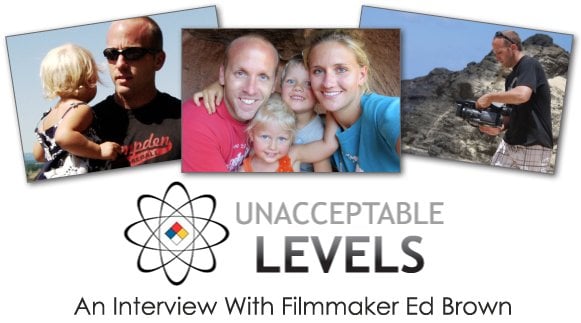Filmmaker Ed Brown On the Environment and His Documentary “Unacceptable Levels”
Years ago at Thanksgiving, our neighbors recounted a discussion they’d had over the number of feathers they found while preparing their grocery store bought turkey. The husband had shrugged and said, “Every industry has a tolerance policy… there’s probably a 5-feather margin of error on any bird that size.”
At the time, I worked in marketing for an apparel company and agreed that there was a shrinkage tolerance on cotton t-shirts. As I thought about my own words, I realized everyone around me wore the same lost-in-thought expression.
And then my neighbor’s eyebrows raised as she said, “Well, shouldn’t the margin of error on food be more strict than t-shirts?”
For filmmaker Ed Brown, a similar realization came one day as he drank a glass of water that “smelled and tasted like a swimming pool.” That was when he learned that there are “acceptable levels” of chlorine and other contaminants in water.
After his wife miscarried twice between having two healthy children (with no obvious reasons), Ed suspected there was more to the chemical connection than most of us realize. So he started asking questions.
Ed went beyond your average online search to find his answers. He sought out environmental experts and government leaders, and thankfully, he brought his video camera along the way. The result is the eye-opening documentary Unacceptable Levels, which carefully explains the chemical revolution… surprisingly without throwing a lot of blame around.
We spoke to Ed about the film, his research, and how he maintains a “we’re all in this together” message throughout the overwhelming information he encountered while creating his documentary.
So the concept of “acceptable levels” inspired you to make changes in your own life. At what point did you realize you couldn’t keep this to yourself?
Ed Brown: The driving force was initially my family… my kids, my wife’s miscarriages that never had an obvious cause.
But the further I got into this – the 80,000 chemicals that our corporations, our courts, and even the government, feel are an acceptable level of risk – the more I realized this issue was way bigger than protecting just my own family.
Randy Hayes of the Rainforest Action Network said this movie makes it impossible to hide behind the numbers. It’s true. How did you find that delicate balance of educating people without overwhelming or scaring them?
Ed Brown: The numbers are big. It’s a mess that happened slowly. We have to consider that it took 100 years to get into all of this. We can’t use our “take a magic pill” mentality to get out of it. So it’s a long-term problem, and I’m giving people the information so they can make better choices. These changes, over time, will be the solution.
From what you learned making this film, what’s your advice to a parent wondering where to start making changes?
Ed Brown: It basically comes down to three areas: water, food, and personal care products.
We’re made up of 70% water, and the planet is mostly water. So drinking pure water matters.
Do a little research. Ask a few questions and find out the best way to give pure, filtered water to your family. And from an activist standpoint, do what you can to protect our water. What we let businesses dump into our water supply matters not only now, but for generations.
Our food is not exactly what we think it is today. 90% of the food we eat today is processed with chemicals and preservatives. The film really gets into the details, but the important thing is to know what you’re feeding your family. Read labels and demand more detailed labeling.
Then there are personal care products. After my wife’s second miscarriage we were reading the bottle of a skin care product she’d been using, and we saw five carcinogens in the ingredients.
We have to pay attention. The marketing behind a product is why we buy or don’t buy it. If they called food or personal care products what they really are, nobody would buy them. Understand that you are not just a number or target demographic.
Before you eat, drink, or buy anything, ask yourself,
“Is this really good for me?”
“What is it really?”
“Do I really want it to go into my body?”
As you say at the film’s conclusion, it’s not really an end. So we’re inviting Green Child readers to begin the conversation as well.
Ed Brown: You don’t have to take on the world to change it. Just pick one thing in your life. Water, food, regulations – it doesn’t matter. Just pick something. Become curious about it and start asking questions. Find the answers just like I did.
And know that of all the people out there, you finally found someone that can truly make a difference. That person is – and always has been – you.

